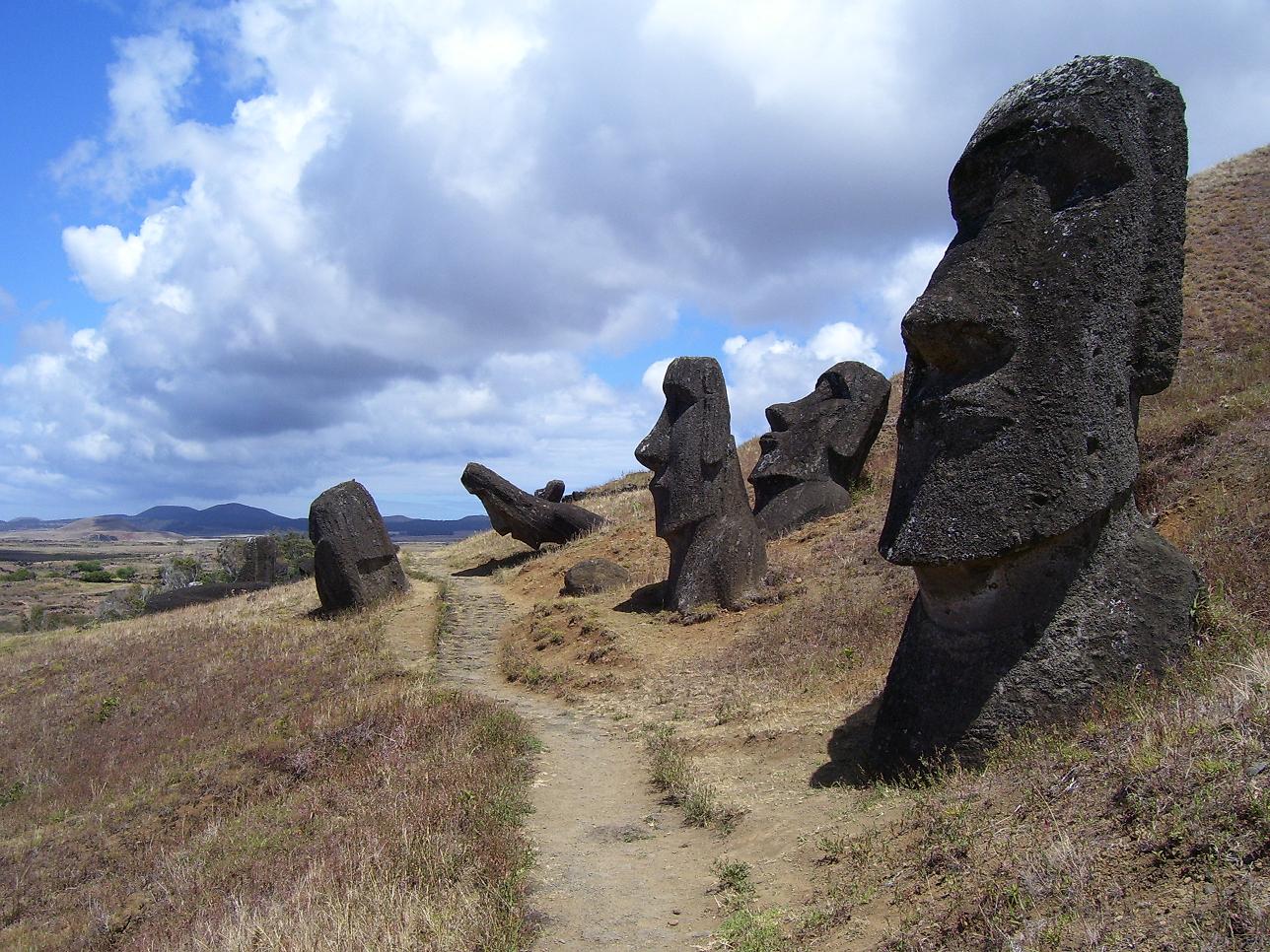A positive review of an anti-Jared Diamond book I wrote in 2011. I would probably be more negative to a book like this today, since its real message seems to be "Diamond isn´t PC enough", which is like yeah whatever. I´m also less optimistic than when I wrote this. That being said, the book does raise some interesting points, for instance about Easter Island and the Natives in the US Southwest.
"Questioning Collapse" is a criticism of
best-selling author Jared Diamond and his books "Collapse" and
"Guns, germs and steel". The authors have a left-wing, "postcolonial"
political agenda, which presumably explains the negative reviews of the book on
this product page. Personally, I liked the sacrilegious character of this book!
The contributors' main objection to "Guns, germs and steel" is the
book's determinism and implicit Euro-centrism, in which the success of Europe
at the expense of the rest of the world is seen as a consequence of pure
geography. In this scenario, the downfall of non-European cultures at the hands
of Europeans is an unfortunate but inevitable process which simply couldn't
have been otherwise. Nobody is guilty, especially not Europeans. Diamond has
simply revamped the colonizer's view of the world. An over-simplified and
exaggerated critique of Diamond? Sure, but Diamond's book *could* be given this
particular spin, despite the anti-racist agenda of its author.
As for "Collapse", the authors question whether it's meaningful to
view the history of the world as a series of collapses at all. Rather than
"collapse", many societies simply change to cope with changing
circumstances, making "resilience" a more meaningful term, or even
"success". While this sounds like a more optimistic view of history
than the quasi-Spenglerite view of Diamond, the contributors seem mostly interested
in absolving Third World peoples from the charge of ecocide. Still, they have a
certain point when accusing Diamond of subconscious Euro-centrism in
"Collapse", as well. Diamond, it seems, never regards Western
civilization as having collapsed. But why not? What about the fall of the Roman
Empire, for instance? Or the Greek Dark Ages? Or the plagues and general mayhem
of the late medieval period? Westerners tend to look at their own civilization
as...well, a story of successful change and adaptation, rather than as a "collapse"
(the fall of Rome being the only exception to the rule - and we seem to have
survived that one, too!). Why not look at the Maya, the Hohokam or other
non-European cultures in the same way?
The bulk of "Questioning Collapse" deals with some of the examples of
collapse described by Diamond: Easter Island, the Norse settlements at
Greenland, the Anasazi and the Hohokam in the American Southwest, the Maya, the
Inca, Mesopotamia, and modern Rwanda and Haiti. China and Australia are also
discussed. Of course, only sharp critics of Diamond have been invited to the
show, and they often claim that what actually happened was pretty much the very
opposite of what Diamond narrates in his books. Since archaeologists and
historians tend to disagree on almost everything, the reader should study the
issues further before making up his mind. Still, "Questioning
Collapse" does raise many interesting points.
According to Terry Hunt and Carl Lipo, the ecocide at Easter Island (Rapa Nui)
is largely a myth. The forests at Rapa Nui were destroyed by rats, not by
humans. (Of course, since the rats were introduced by humans, I suppose a deep
ecologist *would* see it as a case of human-induced ecocide. Diamond, however,
isn't a deep ecologist.) Hunt and Lipo also claim that the population collapse
at Easter Island took place *after* the European colonization, while the
ecocide hypothesis claims the opposite - crazed natives died like flies after
cutting down the last palm tree already before the arrival of the colonists.
Joel Berglund questions whether the Norse settlements on Greenland really
failed. His alternative hypothesis is that the settlers simply emigrated when
climactic conditions became too severe. He also points out that the settlements
lasted for 500 years - longer than many modern nation-states. Of course,
Diamond might retort that this is beside the point, since the settlements *did*
fail during the 14th century, perhaps because they were culturally conservative
and refused to adapt to changing weather conditions by choosing a different
lifestyle. However, I don't think this is merely a terminological squabble.
Sure, the Norse settlements "failed", but perhaps they adapted by
simply leaving Greenland? And shouldn't a culture that lasted for 500 years in
*Greenland* be thought of primarily as a success story, rather than zooming in
on its eventual disappearance?
Michael Wilcox claims that virtually everything we ever heard about the
vanished Native civilizations of the U.S. Southwest is a gigantic hoax. There
never were a people called the "Hohokam". The ethnic group living on
the territory in question are know as O'Odham or Pima. They didn't vanish. The
real collapse of their culture took place during the 19th century, due to
actions taken by White European settlers and the federal government. The
"Anasazi" are equally problematic. Wilcox believed that the abandoned
towns of these vanished Native cultures were really a kind of ritual, religious
centres (something like a Native Mecca). Their abandonment didn't spell the
doom of an entire civilization. Somewhat disappointingly, Wilcox says very
little about the lurid stories concerning Anasazi cannibalism.
The chapters I found most interesting deal with the Maya and the Inca.
According to McAnany and Gallerta Negron, the Maya culture *didn't* collapse.
In fact, it didn't even cease to be a high culture. Rather, the Maya
transformed their "Classical" culture to a more commercial, maritime
culture at the coasts of Central America and southern Mexico during the
"Postclassical" period. While some areas were depopulated, others
experienced a population growth. The society may have become less
"complex", but it certainly didn't collapse. More as a sidebar, Mel
Gibson's film "Apocalypto" is in for a good whipping for its terrible
portrayal of the Maya.
As for the Inca, David Cahill points out that Diamond's narrative of the
Spanish conquest is grossly over-simplified. The Spaniards arrived at a
particularly propitious moment, since the Inca Empire was going through a civil
war between two pretenders to the throne. Many non-Incans felt oppressed by the
empire, and were more than willing to enlist on the side of the Spanish. After
the conquest, the Spanish took over the imperial infrastructure and ruled with
the aid of local elites. Also, it took the Spanish about 50 years to really
pacify Peru after their initial (and swift) conquest. Obviously, "guns,
germs and steel" did play a role in the Spanish conquest - the guns at the
start, and the germs later on. However, without various chance events and the
enlistment of native support, Pizarro might very well have failed. Cahill also
gleefully points out that the Inca Empire was more centralized, well organized
and prosperous than Spain - nobody in Tawantinsuyu (the real name of the Inca
Empire) starved, due to food distribution by the state, while famines were
common in Spain. Pizarro himself came from an impoverished Spanish province.
The weakest chapters in the book are those dealing with Rwanda and Haiti. In
fact, the Haitian chapter says very little about the actual problems mentioned
by Diamond: the deforestation of Haiti as compared to the better situation at
the Dominican side of the border. Drexel Woodson opines that Haitian peasants
cut down trees to meet fuel needs in the cities and for export. Which
proves...what? Why don't Dominican peasants do the same thing? The Rwandan
chapter argues against Diamond's Malthusian take on the Rwandan genocide, but
most of it is devoted to an eye-witness account of the chaos in Kigali during
that terrible year of 1994. Of course the Rwandan genocide has political and
ethnic causes, but you don't have to be an orthodox Malthusian to realize that
relative overpopulation and scarcity can happen. What about the Irish potato
famine? Further, a kind of "Malthusian" catastrophes can take place
in a world marked by colonial and neo-colonial relations of exploitation and
dependence. Perhaps the Rwandan disaster wasn't "Malthusian" even in
this qualified sense, but if so, author Christopher Taylor hasn't proved it. He
didn't even try.
To sum up, I like "Questioning Collapse". But yes, I somehow liked
"Collapse", too. Diamond's book does indirectly disprove some of the
more romantic strands of eco-radicalism, since he mentions both egalitarian
cultures which didn't live in complete harmony with nature, and hierarchic
societies which did. I wonder what the contributors to this volume think about
that aspect?
I cannot vouch for every single fact in "Questioning Collapse", and
the debate about the merits and demerits of Jared Diamond's magna opera will
surely continue. I didn't mind the contributors' "politically
correct" deconstruction of Mr. Diamond's subliminal Euro-centrism, but
what I found most inspiring was the idea that our history is one of resilience
and change rather than "collapse". If the Maya and the O'Odham could
survive their supposed "collapses", so can we.
I hope.




.jpg)


